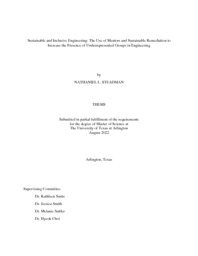
ATTENTION: The works hosted here are being migrated to a new repository that will consolidate resources, improve discoverability, and better show UTA's research impact on the global community. We will update authors as the migration progresses. Please see MavMatrix for more information.
Show simple item record
| dc.contributor.advisor | Smits, Kathleen M | |
| dc.contributor.advisor | Smith, Jessica | |
| dc.creator | Steadman, Nathaniel L. | |
| dc.date.accessioned | 2022-09-15T13:58:43Z | |
| dc.date.available | 2022-09-15T13:58:43Z | |
| dc.date.created | 2022-08 | |
| dc.date.issued | 2022-08-12 | |
| dc.date.submitted | August 2022 | |
| dc.identifier.uri | http://hdl.handle.net/10106/30975 | |
| dc.description.abstract | The recruitment and retention of underrepresented groups in engineering, such as women, has been a priority for many decades to diversify the profession to meet the current demand for engineers. Unfortunately, barriers continue to inhibit the recruitment and retention of underrepresented students in engineering, thus reducing the impact of these efforts. A potential barrier is a lack of social connection to the technical problem definition, design, and decision-making that engineers utilize, prioritizing technical knowledge over social. Previous research has theorized that the incorporation of social considerations in technical engineering design increases interest in engineering for underrepresented groups. The purpose of this thesis is to challenge the scope of traditional engineering in efforts to improve the retention and recruitment of underrepresented groups to increase the diversity and inclusivity of the profession through the development of education outreach programs and integration of socially and environmentally just principles into sustainable remediation. The recruitment of women to engineering can begin at the middle school level through the incorporation of an informal outreach program that uses college student mentors partnered with middle school mentees to promote STEM attitudes and challenge stereotypes surrounding engineering identity. Middle school aged girls who participated in STEM mentoring programs over the course of several semesters saw increased growth in STEM attitudes. Through similar programs, students can be exposed to the ways that engineers can directly achieve societal good with the communities they work in. Additionally, these same underrepresented groups can then be retained through specific integration of socially just design focused on community involvement in the decision-making process. Application of social context can and should be done in engineering projects through environmental justice and sustainability indicators. Through examining a case study in Ogoniland, Nigeria, a framework for evaluating remediation project using adapted social indicators and procedural justice can account for engineering projects in complex social contexts, such as polluting informal economic livelihoods. The findings of this thesis demonstrate how engineering stereotypes can be challenged both in identity and in the profession, challenging the dominant image of engineering. This work provides the necessary foundation for potentially addressing a barrier in the recruitment and retention of diverse perspectives interested in achieving global societal good. | |
| dc.format.mimetype | application/pdf | |
| dc.language.iso | en_US | |
| dc.subject | Sustainable remediation | |
| dc.subject | Informal economic livelihoods | |
| dc.subject | Educational outreach programs | |
| dc.subject | Environmental justice | |
| dc.title | Sustainable and Inclusive Engineering: The Use of Mentors and Sustainable Remediation to Increase the Presence of Underrepresented Groups in Engineering | |
| dc.type | Thesis | |
| dc.degree.department | Civil Engineering | |
| dc.degree.name | Master of Science in Civil Engineering | |
| dc.date.updated | 2022-09-15T13:58:43Z | |
| thesis.degree.department | Civil Engineering | |
| thesis.degree.grantor | The University of Texas at Arlington | |
| thesis.degree.level | Masters | |
| thesis.degree.name | Master of Science in Civil Engineering | |
| dc.type.material | text | |
Files in this item
- Name:
- STEADMAN-THESIS-2022.pdf
- Size:
- 773.3Kb
- Format:
- PDF
This item appears in the following Collection(s)
Show simple item record


